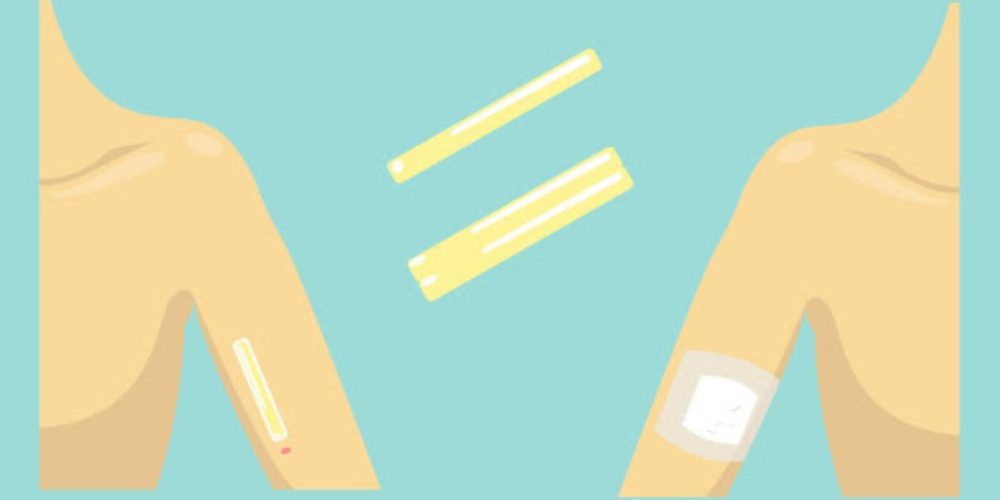THE IMPLANT: What is it?
A contraceptive implant is a long-acting, reversible birth control method that involves a small, flexible plastic rod about the size of a matchstick being placed under the upper arm’s skin. This implant releases a low, steady dose of the hormone progestin, which prevents pregnancy by inhibiting ovulation through thickening the cervical mucus and thinning the lining of the uterus.
As this can take up to 3 years, have you ever had long-term concerns associated with contraceptive implants? This post will talk about these concerns – health benefits, risks and considerations.
Safety of Contraceptive Implants
Contraceptive implants are generally considered safe with a low risk of severe complications. However, with 99% effectiveness, it is vitally important to be informed about the overall safety of this method before making a decision.
Health
Individual health conditions are a significant determinant of the implant’s safety. Certain health conditions, such as a history of breast cancer, liver disease, or unexplained vaginal bleeding, may preclude some women from using the implant. Therefore, a thorough health check-up and consultation with a healthcare professional are crucial before getting an implant.
Hormone
The progestin released by the implant could potentially cause irregular periods, weight gain, headaches, mood changes, and acne. Understanding these potential side effects can help women make an informed choice about whether the implant is the right contraceptive method for them.
Lifestyle
Some women may prefer the implant because it doesn’t require daily attention, while others may feel uncomfortable with the idea of a foreign object in their bodies. It’s important to choose a birth control method that fits with one’s lifestyle and comfort level.
Do Contraceptive Implants Have Long-Term Health Effects?
Contraceptive implants need not constant attention and can be left in place for up to three years. However, some women may be concerned about the long-term effects of having an implant in their bodies. Contraceptive implants impact long-term health with benefits and risks.
Health Benefits:
Reduced Risk of Certain Cancers
Contraceptive implants can reduce the risk of ovarian and endometrial cancer. Research suggests that the use of contraceptive implants may be associated with a reduced risk of ovarian cancer, although the evidence is not yet conclusive. A study reported a nonsignificant inverse association between current or recent implant use and ovarian cancer risk compared to never users.
Management of Menstrual Disorders
Contraceptive implants can reduce heavy menstrual bleeding and pain associated with periods. It can also help regulate irregular periods, making it an attractive option for women who suffer from menstrual disorders.
Improvement in Acne Symptoms
Acne is a common side effect of contraceptive implants, and some studies suggest that combined hormonal contraception can improve acne in implant users.

Health Risks:
Changes in Menstrual Bleeding Patterns
Contraceptive implants can cause significant changes in menstrual bleeding patterns. Around 20% of women using contraceptive implants will have no bleeding, while almost 50% will experience infrequent or prolonged bleeding. Some may also experience long-term spotting or heavier periods.
Possible Weight Gain and Mood Changes
Some women may experience possible weight gain and mood changes as a result of using contraceptive implants. It’s important to note that these are potential side effects, and not all women will experience them.
Allergic Reactions (rare but serious risks)
While rare, allergic reactions are listed as serious risks associated with contraceptive implants. Symptoms of a severe allergy include a swollen face, tongue, or throat or having trouble breathing or swallowing.

Long-Term Health Considerations
Contraceptive implants are a long-acting, reversible birth control method that can prevent pregnancy for several years. When considering the long-term health implications of contraceptive implants, individuals should be aware of their impact on cardiovascular health, bone health, mental health, and fertility.
Cardiovascular Health
The use of estrogen-free contraceptive implants may be a better choice for individuals at risk of blood clots associated with methods containing estrogen. However, although rare, some women using the implant have a higher risk of heart attacks, blood clots, or strokes.
Bone Health
Research on the long-term effects of contraceptive implants on bone health is limited. However, some studies have suggested a potential decrease in bone mineral density with the use of progestin-only contraceptive methods, including implants.
Mental Health
Contraceptive implants have been associated with potential side effects such as mood swings and depression. Individuals need to be aware of these potential effects on mental health when considering this birth control method.
Fertility and Return to Normalcy
One of the benefits of contraceptive implants is a quick return to fertility after removal. If an individual wishes to get pregnant, they can immediately start trying when the implant is removed.
Takeaway: Understanding these factors can help you make an informed choice about using a contraceptive implant. However, the ultimate decision should be made with a healthcare provider consultation, who can offer individualised advice based on specific health circumstances and goals.
Final Thoughts
It is always important to prioritise one’s health and make informed decisions when it comes to reproductive healthcare choices, such as using contraceptive implants. With proper understanding and guidance, individuals can choose the birth control method that aligns with their specific health needs and goals.
By regularly monitoring any potential side effects and staying in touch with a healthcare provider, contraceptive implants are a long-term, safe and effective option for birth control.





